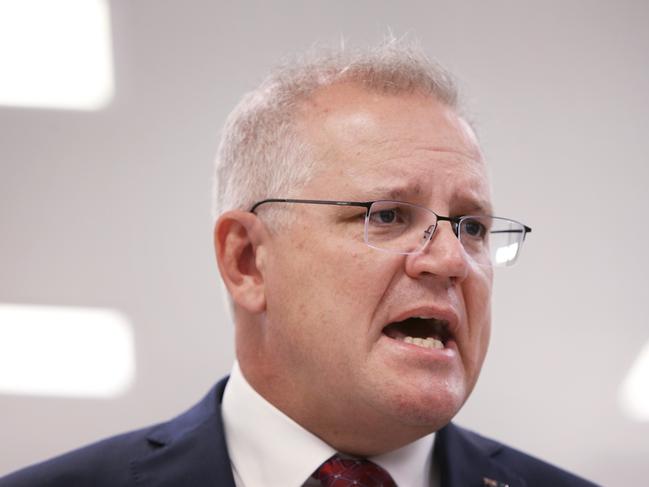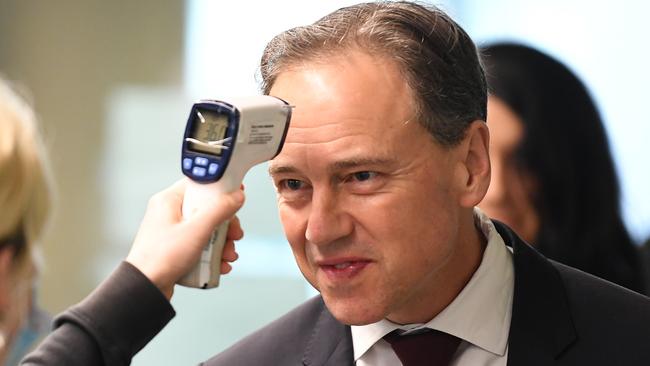Coronavirus: No vaccine could cost Australians $2850 a year
A dire economic warning has been issued to Australians, painting a bleak image of what life will be like if a coronavirus vaccine is not delivered quickly, despite the Prime Minister’s optimism.
Coronavirus
Don't miss out on the headlines from Coronavirus. Followed categories will be added to My News.
- Aged care death toll rises as AstraZeneca challenges PM
- What new ‘super spreader’ COVID-19 strain means for Australia
Australians could be almost $3000 worse off every year until a coronavirus vaccine is found.
New research released by KPMG shows that with the travel industry crippled and costing the economy $117 billion over the next ten years and a lag in migration, the trickle down cost to Australians could be as much as $2850 a year if a vaccine is not rolled out within the next 24 months.
“The challenge for government is: How are we going to come out of this without a significant fall in living standards? The longer [the pandemic] runs, the more there’s an impact on the psyche and there is missing confidence,” ” KPMG chief economist Brendan Rynne told WA Today.
Hope for a vaccine remains high, though, after Prime Minister Scott Morrison announced the government has signed a deal with drug company AstraZeneca to secure the Oxford vaccine for all Australians should it go to market.

The Oxford vaccine is currently in the final phase of human trials and is regarded as one of the coronavirus vaccine frontrunners.
But on Wednesday, AstraZeneca denied the Prime Minister claim thata deal had been secured.
The Pharmaceutical company’s UK Headquarters told pharmaceutical industry newsletter Pharma in Focus all the government has is a letter of intent.
“The LOI doesn’t go into any detail about costs or numbers or anything until we have an idea of what the manufacturing capacity is – that’s a critical piece in the puzzle,” a spokesperson said.
Mr Morrison also claimed CSL will manufacture the vaccine here, but AstraZeneca says as of now there is no such deal.
“Discussions with CSL are ongoing. They’re still looking into whether they have the capability and capacity to produce a vaccine. We’re hoping that those discussions will be concluded swiftly but they’re still ongoing,” the spokesperson said.

Mr Morrison spent much of Wednesday spruiking the deal in a series of media appearances.
“I’m obviously not a medical expert, but my advice is that, you know, we have the capacity to produce that type of a vaccine here in Australia and it’s just a matter of basically getting the formula and off you go,” he told Channel 10.
“Australians will be among the first in the world to receive a COVID-19 vaccine, if it proves successful, through an agreement between the Australian Government and UK-based drug company AstraZeneca,” he said in a media release.
“Under the deal, every single Australian will be able to receive the University of Oxford COVID-19 vaccine for free, should trials prove successful, safe and effective.”
CSL has repeatedly told News Corp its priority is producing the COVID-19 vaccine being developed by the University of Queensland.
“Development of the UQ vaccine candidate remains CSL’s priority.”

“However, we are currently in discussions with AstraZeneca and the Australian Government to assess whether it is possible to provide local manufacturing support for the Oxford University/AstraZeneca vaccine, should it prove successful, while protecting our commitment to the UQ vaccine,” a spokesperson said.
“We are assessing the viability of options ranging from the fill and finish of bulk product imported to Australia through to manufacture of the vaccine candidate under licence. There are a number of technical issues to work through and discussions are ongoing.”
It is likely to take the company months to reconfigure its plant to make the Oxford vaccine, if it does eventually get a deal to manufacture it.
Both the UK and the US secured deals with AstraZeneca to obtain hundreds of millions of doses of the Oxford COVID-19 vaccine back in May.
They are likely to get it well ahead of Australia, with production of the vaccine is already well advanced in the UK.
Mr Morrison’s office responded to the claims by saying “AstraZeneca has put out a statement on those claims,” but did not provide further detail.
Opposition health spokesman Chris Bowen said no agreement had been signed with AstraZeneca.

“The fact of the matter is, the Prime Minister this morning wasn’t telling the truth.
“Today, AstraZeneca has said there is no agreement that has been signed. When the Prime Minister says Australians will have first access to this vaccine he is simply not telling the truth,” Mr Bowen said.
“The United States has got six agreements, United Kingdom’s got five, Japan’s got three, other countries are managing their risk, ensuring that their citizens will have access to the best chance vaccines in development. The Morrison Government simply isn’t doing that,” Mr Bowen said.
A spokesperson for Mr Morrison later confirmed that all the government has secured is a Letter of Intent, and not a final deal which would allow Australia to manufacture the Oxford vaccine locally.
“Next, in a few days, is a manufacturing agreement, from which you determine dose/price/contract,” the spokesperson told News Corp.
Health Minister Greg Hunt, who signed the Letter of Intent, said the agreement will be for “whole of population … subject to that proving safe and effective through the clinical trials.”
Speaking to the ABC on Wednesday to refute Mr Bowen’s claims, Mr Hunt said, “So for us, that means we can be one of the first countries in the world because of our manufacturing capability to be able to provide that coverage to the population. I think that’s an extremely important development, I think all Australians will welcome that. It’s something that will give us real protection going forward.”
AstraZeneca’s Australian office confirmed to News Corp that they have received the government’s Letter of Intent, but that this does not secure access to the vaccine. They also said the government does not have a purchasing agreement for a COVID-19, as nine other countries do.
“AstraZeneca is pleased to have signed a Letter of Intent with the Australian Government today, ensuring people in Australia are a step closer to having a vaccine against COVID-19 available, should the AstraZeneca / Oxford University candidate, AZD1222, prove successful,” the company said in a statement.
“The next step will be to conclude other contractual agreements, including arrangements with a selected manufacturer who can produce the vaccine locally.”
The company was unable to say whether the vaccine would be available to Australians by Christmas.

“As a company, AstraZeneca is committed to ensuring fair and equitable access to a vaccine against COVID-19, and will provide the vaccine at no profit during the pandemic.”
The US, UK, Japan, Brazil, Latin America, the EU, Russia and South Korea all have purchasing agreements for the AstraZeneca vaccine.
The government has also said that while they will not enforce mandatory vaccination, they are open to introducing incentives similar to ‘no jab no play’ in a bid to encourage all Australians to take up the vaccine.
Mr Hunt also said on Wednesday that the government will consider mandatory vaccinations for Australians returning from overseas travel in a bid to reduce the risk of spread.
“I wouldn’t rule it out. I think that’s very important to be honest,” Mr Hunt told A Current Affair.
“If the medical advice is that it’s required I could certainly imagine that being the case.”
Mr Hunt also said that a medical panel will determine a prioty list for the vaccine roll out, saying “naturally, you would be focusing on the most vulnerable, the elderly, health workers, people with disabilities in terms of the speed of rollout.”
Australians refusing the vaccination could face being banned from flights, restaurants, public transport and other high density environments, Deputy Chief Medical Officer Dr Nick Coatsworth has said.
Speaking to the media on Wednesday, Dr Coatsworth said health officials and ministers are discussing a range of potential restrictions in a bid to encourage Australians to take up the vaccination once it is ready.
To date, there are over 160 vaccine trials taking place around the world, with seven showing advanced promise – including the Oxford University and University of Queensland vaccines.
Originally published as Coronavirus: No vaccine could cost Australians $2850 a year

